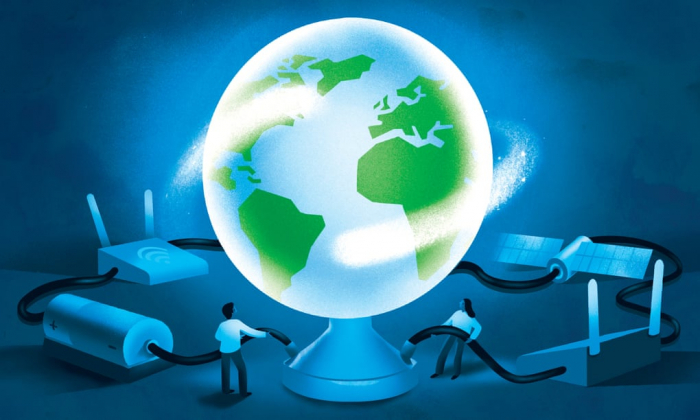By Tim Berners-Lee, invented the world wide web. He is co-founder of the World Wide Web Foundation and chief technology officer at Inrupt
My 100-zip black backpack, previously the logistical and geek centre of my life, now sits neglected in a corner, not needed since Covid-19 abruptly halted my near-constant travel schedule.
Life went on – with limited disruption, if not quite as normal. After all, I have enough space, equipment and internet connectivity to work comfortably from home. In some ways, life has become more efficient. Less jet lag. More sanity.
I’m hardly alone in experiencing this. Those of us fortunate to have jobs we can do from home have tidied up our video conference backdrops and changed how we operate. Where they can, many children have adapted, more or less, to virtual classrooms and the need to compete for workspace with their parents.
We keep in touch with loved ones via computer screens in ways we couldn’t have imagined only three months ago, while the crisis has spawned myriad coping mechanisms – from a boom in online quizzes, art classes and workouts to a golden age for memes.
And while many of us are cooped up indoors, we have seen examples of great collective endeavour and support: communities coming together to help each other and the most vulnerable, albeit keeping two metres apart.
In all of these things, the web has been the critical unifying force, enabling work, school, social activity and mutual support. Always intended as a platform for creativity and collaboration at a distance, it is great to see it also being used more than ever for compassion at a distance too. This is all very well, of course, if we have the web at our fingertips. But we are the lucky ones. Billions of people don’t have the option to turn to the web in times of need or normality. A gross digital divide holds back almost half the planet when it most needs the web.
This divide is most acutely experienced in developing countries. The position is particularly dire across Africa, where only one in four people can access the web and the benefits that so many of us take for granted. Women, in particular, in the developing world, are excluded, with men 21% more likely to have online access – rising to 52% in the world’s least developed countries.
The challenge extends to the wealthiest nations, too: 60,000 children in the UK have no internet at home and device poverty stops many more from learning online while schools remain closed.
In the US, an estimated 12 million children live in homes without broadband connectivity, and people are parking cars outside schools and cafes, desperate for a connection good enough to learn and work “from home”. These inequalities fall along the familiar lines of wealth, race and rural v urban divides.
Working from home isn’t an option for many — including some who have jobs that could be done remotely. Businesses in areas without the infrastructure to trade online are denied a lifeline that is keeping others around the world afloat.
The Alliance for Affordable Internet, an initiative of the World Wide Web Foundation, which was the foundation that I co-founded with Rosemary Leith, has outlined urgent actions that governments and companies should take to provide this lifeline to more people as quickly as possible.
We’re in a world where it is so much harder to get by without the web. And yet the digital divide won’t disappear once this crisis is over. The ever-quickening march to digitisation has become a sprint. We must make sure those currently in the slow lane have the means to catch up. Otherwise billions will be left behind in the dust. As Covid-19 forces huge change to our lives, we have an opportunity for big, bold action that recognises that, as with electricity in the last century and postal services before that, the web is an essential utility that governments and business should combine to deliver as a basic right.
History shows us that after all great global upheavals there are major attempts to repair the damage and rebuild, with some more successfully delivered than others. In the midst of this turmoil we must surely strive to ensure some good emerges out of the darkness.
The web can and must be for everyone — now is our moment to make this happen. We have the technical means to connect the entire world in meaningful and affordable ways: we now need the will and the investment.
Governments must lead the way. They must invest in network infrastructure, not only in urban centres, but in rural settings where market forces alone fail to connect residents. And because data affordability remains one of the biggest barriers to access, these networks must be efficient. For example, policies that encourage service providers to share network infrastructure, and regulations designed to shape competitive markets for data, can go a long way towards bringing down costs for users.
And, to connect everyone, governments will need to target typically excluded groups – including people on low incomes, women, and those in rural areas. This means funding public access and digital literacy initiatives to ensure everyone has the skills to use the internet in meaningful ways.
Service providers must invest in network performance, reliability and coverage so that everyone is within reach of high-quality connectivity. We have seen experiments with drones, balloons and satellites to connect hard-to-reach areas. While these don’t replace good policy and investment in proven technologies, innovation such as this is a welcome addition to the mix.
There is nothing to stop governments and companies making a choice now, to accelerate progress on connectivity where good changes are happening and to step up where they aren’t.
Finally, we can all play a role as individuals. If you’ve relied on the web recently, don’t you owe it to the other half of the world to help them get that lifeline, too?
Demand action from your government to make universal internet connectivity a priority. Support a technology NGO such as the World Wide Web Foundation. Back the Contract for the Web — a collaborative project to build a better web, with universal connectivity as a key priority.
Just as people campaign for clean water and access to education, we need a global campaign for universal internet access.
We must, of course, be more alert than ever to the web’s shortfalls – the privacy violations, the misinformation and the online gender-based violence that has become far too familiar. But these very real problems must not deter us from achieving the foundational challenge of making the web available to all.
Just as the world decided that electricity and water were basic needs that should reach everyone, no matter the cost, we should recognise that now is our moment to fight for the web as a basic right. Let’s be the generation that delivers universal internet access.
The Guardian
















































